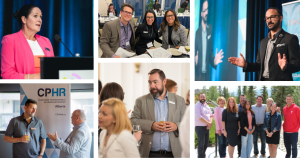
Members of CPHR Alberta belong to a community of 6,000 HR professionals and business leaders. Our community includes 3,000 + CPHRs, living and working in Alberta.

Your guide for professional development and networking events specific to HR professionals in Alberta and Canada.

There are four paths to the CPHR designation. All paths require you to be an active member of the Association and a minimum education requirement to pursue the designation.
- Standard Path
- Accredited Path
- Senior Path
- Coursework Path

CPHR Alberta offers organizations a variety of opportunities to reach our 6,000 members. Province-wide and regional events, regular publications and industry-specific surveys provide multiple channels to connect with HR professionals who are leaders and influencers within their companies.
You are here
CPHR Alberta News Blog
HRIA News Blog
CPHR Alberta News Blog












.png)










